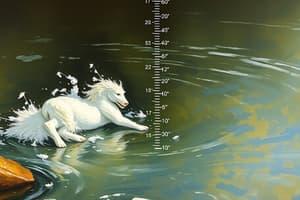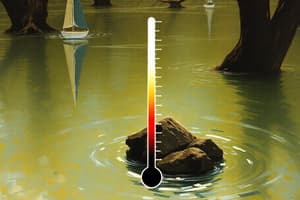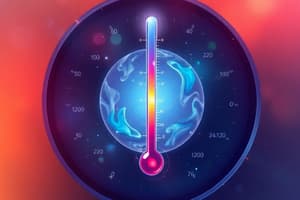Podcast
Questions and Answers
What is the temperature at which water coexists as a solid, a liquid, and a gas?
What is the temperature at which water coexists as a solid, a liquid, and a gas?
- 0°C and 32.018°F (correct)
- 100°C and 212°F
- 0 K and -273.15°C
- None of the above
What is the lowest possible temperature according to the Kelvin scale?
What is the lowest possible temperature according to the Kelvin scale?
- -40°C
- -273.15°C
- -89°C
- 0 K (correct)
What is the conversion factor to convert from Celsius to Kelvin?
What is the conversion factor to convert from Celsius to Kelvin?
- 273.15 (correct)
- 273
- 180
- 100
At what temperature do the Celsius and Fahrenheit scales coincide?
At what temperature do the Celsius and Fahrenheit scales coincide?
What is the normal human body temperature according to the Fahrenheit scale?
What is the normal human body temperature according to the Fahrenheit scale?
What is the boiling point of water according to Anders Celsius' original scale?
What is the boiling point of water according to Anders Celsius' original scale?
How do the Fahrenheit and Celsius scales differ in terms of temperature differences?
How do the Fahrenheit and Celsius scales differ in terms of temperature differences?
What is the unit kelvin defined as a fraction of?
What is the unit kelvin defined as a fraction of?
What is the temperature at the surface of the sun according to the text?
What is the temperature at the surface of the sun according to the text?
What is the coldest temperature ever recorded on the Earth's surface?
What is the coldest temperature ever recorded on the Earth's surface?
Flashcards
Temperature
Temperature
The measure of how hot or cold something is, based on the average kinetic energy of its molecules.
Temperature Scales
Temperature Scales
Different ways to measure temperature.
Celsius Scale
Celsius Scale
A temperature scale where 0°C is the freezing point of water and 100°C is its boiling point.
Kelvin Scale
Kelvin Scale
Signup and view all the flashcards
Fahrenheit Scale
Fahrenheit Scale
Signup and view all the flashcards
Absolute Zero
Absolute Zero
Signup and view all the flashcards
Celsius to Fahrenheit Conversion
Celsius to Fahrenheit Conversion
Signup and view all the flashcards
Fahrenheit to Celsius Conversion
Fahrenheit to Celsius Conversion
Signup and view all the flashcards
Thermometer
Thermometer
Signup and view all the flashcards
Infrared Thermometer
Infrared Thermometer
Signup and view all the flashcards
Study Notes
Temperature Measurement Units
- Water ice melts at 0°C.
- The average temperature on Mars is -81°F.
- The standard room temperature is 288.15 K.
What is Temperature?
- Temperature is the objective measure of how hot or cold an object is.
- It is defined as the average kinetic energy of the molecules in an object.
- The kinetic energy of molecules increases when a heat source is placed near a container, causing molecules to move rapidly.
- The average kinetic energy of all molecules is called the temperature.
Measuring Temperature
- Temperature is measured using thermometers.
- There are various types of thermometers, such as alcohol and mercury thermometers, which depend on the increase of volume of substances as the temperature increases.
- Electrical resistance, color, and emission of infrared are also used to design thermometers.
- An infrared thermometer measures temperature by focusing infrared light from an object to a detector, which converts it into heat, producing a voltage output.
How Thermometers Work
- Thermometers work by measuring their own temperature.
- When a thermometer is placed in contact with a substance or object, heat is transferred from the hotter object to the colder one until thermal equilibrium is reached.
- The thermometer then registers its own temperature.
Temperature Scales
- There are three common temperature scales: Fahrenheit (F), Celsius (C), and Kelvin (K).
- Fahrenheit scale:
- Developed by Daniel Gabriel Fahrenheit in 1724.
- Freezing point of water is 32°F, boiling point is 212°F.
- Celsius scale:
- Developed by Anders Celsius.
- Freezing point of water is 0°C, boiling point is 100°C.
- Kelvin scale:
- Also called the absolute temperature scale.
- Defines the lowest possible temperature, 0 K, as absolute zero.
- Freezing point of water is 273.15 K, boiling point is 373.15 K.
Temperature Unit Conversion
- Fahrenheit to Celsius and Kelvin:
- To convert from Fahrenheit to Celsius, use: C = (F - 32) × 5/9.
- To convert from Fahrenheit to Kelvin, use: K = (F - 32) × 5/9 + 273.15.
- Celsius to Fahrenheit and Kelvin:
- To convert from Celsius to Fahrenheit, use: F = C × 9/5 + 32.
- To convert from Celsius to Kelvin, use: K = C + 273.15.
- Kelvin to Fahrenheit and Celsius:
- To convert from Kelvin to Fahrenheit, use: F = (K - 273.15) × 9/5 + 32.
- To convert from Kelvin to Celsius, use: C = K - 273.15.
Interesting Facts
- The normal human body temperature is around 98.6°F.
- The coldest temperature ever recorded on Earth's surface was -89°C at Vostok Station, Antarctica.
- The temperature at the surface of the sun is around 5800 K.
- The Celsius scale was initially reversed, with 0°C as the boiling point and 100°C as the freezing point, but was later reversed to its current form.
Studying That Suits You
Use AI to generate personalized quizzes and flashcards to suit your learning preferences.



